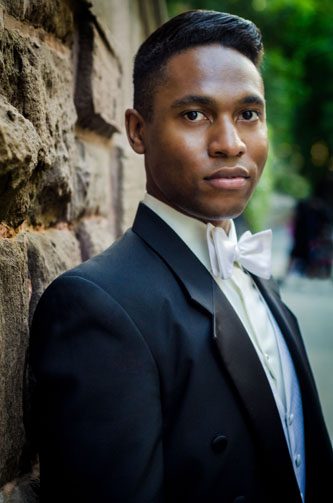Dessoff Choirs illuminate Whitman Bicentennial with a trio of world premieres

Malcolm J. Merriweather led the Dessoff Choirs Friday night.
On Friday night, Walt Whitman’s exact 200th birthday, the Dessoff Choirs under the baton of music director Malcolm J. Merriweather, presented an absorbing program spotlighting three world premieres that provided a template of contemporary American choral music in the 20th and 21st centuries.
Now in its 95th season, the Choirs comprise a 40-voice core with other smaller choirs engaged as needed. The Choirs have a diverse repertoire embracing old masters to cutting-edge contemporary in settings as disparate as a New York Philharmonic concert and a rock tour. For this event, they occupied the Church of St. Paul and St. Andrew on 86th St., a venue with a bit of an echo that one’s ears adjusted to as the music progressed.
All three world premieres were intense, filled with creative ideas, but accessible and concise.
None More Than You by Eve Beglarian emerges from a philosophy of language in which consonants represent necessities, but vowels suggest possibility. An electronic tape features the vocal ensemble, Roomful of Teeth, enunciating the consonants in the opening verses of the Gospel of John (“In the beginning was the Word…”) but without vowels (“N th bgnng wz th wrd…”). The consonants sputter, moan, roar, mumble, leading into the poem itself which avers, “Those are not the words…They are in the air, they are in you.” Through the progression of vocal effects and sung text, the work ultimately ends in nothing but vowels, lingering like haloes in the air. The effect is electrifying and even spiritually enlightening.
Douglas Geers’ As Adam Early in the Morning extracts the word, “love,” from the one extant recording of Whitman’s voice and spins it into 24 chords which scaffold the five-line song. At times, the accompanying vocal effects—like a cheap guitar being restrung and tuned—seemed at odds with the text with its sensual aura (“Touch me, touch the palm of your hand to my body as I pass…”). But the work evolves, even though there are barely 43 words in Whitman’s lyric. Through this evolution, warm human touch emerges through the chorus seemingly out of the electronic chaos. A clear soprano voice soars above it all with the single word, “body,” like someone submerged in the sea rising to the surface with desperation and joy.
Both here and in the Beglarian work, amplified sounds were used, mostly effectively, thoughthe volume could have been reduced without harming the dynamics of either work.
Matthew Aucoin’s four settings offered two choruses from Crossing, his opera about Whitman and two derived from his Three Whitman Songs songs for baritone. Aucoin’s lyrical style springs from an authentic originality. His writing is fresh and invigorating, with energetic piano lines that tumble from the instrument, mirror each other, and flirt briefly with atonality only to return to the tonic before we realize what happened. Choral dissonances create a sense of yearning in “O powerful western fallen star,” with emphases on the words “hold me” and “helpless.” These featured some spectacular piano playing by Dessoff pianist Steven Ryan.
This sensitivity to Whitman’s language infuses the song, “A Clear Midnight,” as the chorus swells to the words, “free flight,” a sense of opening up harmonically in “Thee fully forth emerging,” the same soft note repeated for “Night, sleep, death, and the stars.” The final song, adapted not only from Whitman but also from Lorca and Dante, offers a restrained and reflective conclusion that whispers into silence.
Ian Sturges Milliken’s work, Quicksand Years, creates a sense of spiraling down into the earth with no hope of escape. In his commentary, the composer said he wanted to convey the sense of being trapped in today’s political-social climate. Indeed, the low male voices repeating the word “quicksand” and the down-turning chordal progressions offer no more release than a transparent lament by women’s voices, the only uplifting element. “Out of politics, triumphs, battles, life, what at last finally remains?” Whitman asks.
The program led off with an American composer of another era, with Howard Hanson’s Song of Democracy (1957). Hanson’s music here is far better than the jingoistic title promises. The work is nostalgic in the best sense, arousing memories of a simpler time and ideals of truth and kindness that linger if not in our own past, then in those of family legends. Hanson’s use of prosody effectively suggests the sound of hammering when the chorus sings of “building,” while Ryan’s agile phrasings in the piano’s upper register create an effervescent mood.
Gregg Smith’s Two Walt Whitman Songs included an all-too-brief solo by mezzo-soprano Amanda Kelly, whose lovely voice, bright and warm, filled the sanctuary. The work, expressing Smith’s response to “Give Me the Splendid Silent Sun,” was imaginatively conceived, with harmonic variation and sensitivity to the lyrics.
The Dessoff Choirs open their 2019-20 season October 26 with the Fauré Requiem in the Union Theological Seminary. dessofchoirs.org